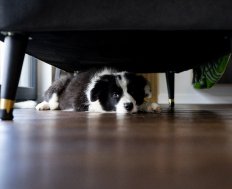
Adopting a Second Dog: A Happy Dog Expert Explains!
The social nature of dogs often leads families to assume their pooch will be even happier if they were to adopt a second dog. In some cases, this may be a good idea, but in others, the adaptation involved in adopting a second dog can be complicated. Not only can it compromise the well-being of the resident dog, but also the new dog, and even the family.
In What Cases Can Adopting a Second Dog Work?
Before considering getting a second dog, a number of factors should be considered to ensure the successful integration and well-being of both dogs.
These include those related to the physical and social environment, factors related to the resident dog, and those related to the newly adopted dog:
1. Considerations About the Physical and Social Environment.
When adopting a second dog, you need to be able to provide sufficient space and necessary elements to ensure both dogs can live together without having to compete or share resources involuntarily. This includes resting areas, toys, food bowls, and so on.
Impact on Your Home & Lifestyle
You should assess whether there are real possibilities to meet the needs of a new dog. For example, if you’re considering adopting a puppy, you should be aware that the pup will need supervision and a high commitment of time during the first few months. They’ll also need special health care (such as vaccinations and deworming), and an age-specific diet. Your family's economic capacity to absorb the expenses of veterinary care and food, which from now on will be double, must also be assessed.
Lastly, you will need consensus from all family members. It is important that the consequences of adopting a second dog are discussed by everyone, as there may be an impact on the lifestyles and routines of those who will live with and care for both dogs. For example, who will take care of the dogs during vacations, outings, or trips? Who is going to take them for a walk or take them to the vet? Will there be enough time for both dogs?

2. Considerations Around Your Resident Dog
Next, you’ll need to consider your resident dog, beginning with their general temperament and sociability. Temperament is a key factor when deciding to adopt a second dog, just as it will be an important factor when selecting the best candidate for adoption.
The ideal situation would be for your resident dog to be well-balanced and docile, friendly, and very sociable with other dogs, as in showing positive interest in meeting other dogs. A dog with these characteristics has a high probability of accepting and adapting quickly to living with a new dog. However, a dog that is generally fearful or unsociable with other dogs is not likely to react positively to you bringing a new dog into the family.
Canine Attitudes & Behaviours
Attitudes towards other dogs is another factor. The resident dog must have acceptable levels of tolerance and "good manners" towards other dogs to ensure that the adoption of the new dog is successful. If the resident dog reacts negatively to the approach of other dogs, consistently shuns them, or behaves aggressively towards them, serious consideration should be given to keeping just the one pooch in the family.
The last consideration for your resident dog is any behavioural problems. A dog with serious or acute behavioural problems may not cope well with a major environmental change, such as the adoption of a second dog into the household. In addition, such changes often generate stress that can aggravate existing problems. If your dog suffers from behavioural problems and you are thinking of adopting a new canine companion, consult with your veterinarian before making any decisions.

3. Considerations Around the New Dog
Finally, you should consider the temperament and age of the new dog you’re thinking of adopting. It is important to choose a dog with a similar energy level, temperament, and age as your current dog. Otherwise, a dog that is too young or too active can overwhelm an older or calmer dog.
In cases where the difference in size is significant between the two dogs, matching their manner and age can become even more important.
Background & Experience
The background and previous experiences of the candidate dog should be considered here. Especially in dogs coming from a rehoming centre, it is relatively common that their breeding conditions, socialisation as a puppy, and early experiences have not been very favourable. This can condition their behaviour and attitudes towards stimuli, and new environments in general, as well as towards other dogs. For example, the adoption of a dog that is poorly socialised or used to being around other dogs can make living with another dog in the same home untenable.
Tips for Successful Adoption of a Second Dog
-
Consult a professional – Before adopting two dogs, consult with your veterinarian or a canine behaviourist to assess their compatibility and get advice on how best to handle their introduction and adaptation.
-
Planning and commitment – Make sure the whole family is committed to getting a second dog and that everyone understands the additional responsibilities involved.
-
Prepare Suitably – Respect the considerations explained above about environment and compatibility between the two dogs.
-
Perform a Gradual Introduction – Introduce both dogs on neutral ground to avoid territorial problems, such as in a quiet walking environment. Monitor initial interactions closely and gradually increase the time they spend together. Also, maintain constant supervision during the first few weeks and provide safe spaces for each dog to rest and retreat if necessary.
For more great insights into caring for our dogs, check out the rest of our Happy Dog Expert articles online! Or to receive the latest news straight into your inbox, sign up for our email newsletter and we’ll keep you updated with everything we’re up to.








































